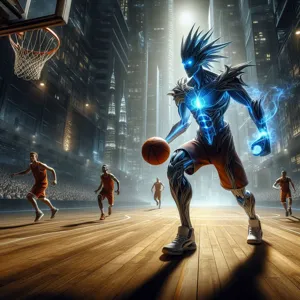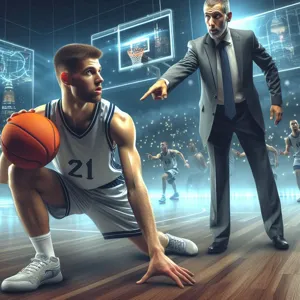In the fast-paced world of basketball, where split-second decisions can make or break a game, maintaining laser-like focus is essential for both players and coaches.
The thrill of the court, the roar of the crowd, and the adrenaline coursing through your veins can easily lead to distractions, but mastering your mind is the key to elevating your performance. Whether you’re a seasoned athlete or a budding enthusiast, honing your mental game can provide the edge you need to excel. In this blog post, we will explore top strategies to help you stay focused during a basketball game, from effective visualization techniques and pre-game rituals to mindfulness practices that can anchor your attention amidst the chaos. Join us as we delve into the mental aspects of the game, giving you the tools to not only enhance your concentration but also to unlock your full potential and bring your best self to the court.
1. Understanding the Importance of Mental Focus in Basketball

Mental focus is paramount in basketball, a game that demands not only physical prowess but also sharp cognitive skills. It’s not enough to simply know the plays or possess exceptional athletic ability; success on the court hinges on the player’s ability to maintain a clear and concentrated mindset throughout the game. Unlike many sports, basketball is fast-paced and dynamic, with split-second decisions that can mean the difference between victory and defeat. This constant flux requires players to be in tune with their own thoughts while also being acutely aware of their teammates and opponents.
When a player is mentally focused, they can better read the game, anticipate movements, and react swiftly. This heightened awareness allows for improved communication on the court, fostering teamwork and synergy among players. Moreover, mental focus directly impacts a player’s shooting accuracy, defensive positioning, and ability to execute complex plays under pressure.
Understanding that mental distractions—such as crowd noise, the pressure of the moment, or even personal worries—can derail performance is essential. A focused mindset not only enhances individual performance but also instills a sense of confidence and resilience. Players who cultivate this mental discipline are often those who thrive in high-stakes situations, maintaining composure while others may falter. Therefore, recognizing the importance of mental focus is the first step in mastering it, paving the way for strategies that will enhance concentration and elevate overall gameplay.
2. Pre-Game Rituals: Setting the Right Mindset
Pre-game rituals can serve as powerful tools to prime your mind and body for the challenges ahead on the basketball court. These rituals, whether simple or elaborate, help create a sense of routine and familiarity, allowing players to transition from the distractions of the outside world to the intense focus required for the game.
start by identifying what makes you feel centered and ready to play. For some, this might involve listening to a carefully curated playlist of motivational songs that elevate their energy and mood. Others may find solace in a quiet moment of reflection or meditation, visualizing success and the plays they intend to execute.
Physical warm-ups are also vital components of this ritual. Engaging in dynamic stretches or light drills not only prepares your muscles but also signals to your brain that it’s time to shift into game mode. This can be complemented by practicing specific skills, such as shooting or dribbling, to build confidence and reinforce muscle memory.
Additionally, mental preparation should not be overlooked. Consider jotting down key affirmations or strategies on a piece of paper or in a digital note that you can reference before stepping onto the court. This serves as a reminder of your goals and capabilities.
Finally, don’t underestimate the power of camaraderie. Engaging in a team huddle or sharing encouraging words with teammates can create a bond and foster a positive mindset. These moments help to build collective confidence and focus, ensuring that everyone is aligned and ready to tackle the game ahead.
By establishing a pre-game ritual that resonates with you, you can effectively set the right mindset, enhancing your focus and performance when it matters most. Embrace these moments as essential preparations that pave the way for your success on the court.
3. Visualization Techniques: Seeing Success Before it Happens

Visualization techniques are powerful mental tools that can dramatically enhance your focus and performance during a basketball game. This practice involves imagining yourself executing plays with precision, sinking every shot, and moving fluidly across the court. By creating vivid mental imagery of success, you not only boost your confidence but also prepare your mind and body for the actual performance.
Begin by finding a quiet space where you can concentrate without distractions. Close your eyes and take a few deep breaths to center yourself. Picture yourself in the game—feel the texture of the basketball in your hands, hear the sounds of sneakers squeaking against the hardwood, and visualize the scoreboard ticking in your favor. Envision specific scenarios, like breaking through a defender for a layup or making that crucial three-point shot as the buzzer sounds. Engage all your senses in this mental rehearsal; the more detailed your visualization, the more effective it will be.
Research shows that visualization activates the same neural pathways in the brain as actual physical practice, allowing you to mentally prepare and develop muscle memory without stepping on the court. As you consistently practice visualization, you will find that your body responds more naturally to the situations you envisioned. You become not just a player reacting to the game, but a strategic athlete who anticipates plays and executes with confidence.
Incorporate visualization into your pre-game routine—spend a few minutes each day imagining your ideal performance, and watch as your focus sharpens and your game elevates. With this mental practice, you’ll not only see success before it happens; you’ll also feel more prepared to seize it when the moment arrives.
4. Breathing Exercises to Calm Nerves and Enhance Focus
In the heat of a basketball game, the pressure can mount quickly, transforming excitement into anxiety. This is where breathing exercises come into play, serving as a powerful tool to calm your nerves and sharpen your focus. By incorporating structured breathing techniques into your pre-game routine and during breaks in play, you can cultivate a sense of calm that allows you to perform at your best.
Begin by finding a quiet moment—perhaps in the locker room before tip-off or during a timeout. Close your eyes and take a deep breath in through your nose for a count of four, allowing your abdomen to expand fully. Hold that breath for another count of four, feeling the tension dissipate. Then, exhale slowly through your mouth for a count of six, letting go of any lingering stress or distractions. Repeat this cycle several times, focusing solely on the rhythm of your breath.
These exercises not only help to lower your heart rate but also enhance your concentration, enabling you to visualize plays and anticipate your opponents’ movements with clarity. As you practice these techniques regularly, you’ll find that they become second nature, allowing you to enter a state of flow where your mind is clear, and your body feels light.
In the midst of a challenging game, a few moments of intentional breathing can reset your mental state, preparing you to tackle the court with renewed purpose and poise. Whether you’re sinking a free throw or making a crucial defensive play, mastering your breathing can be the key to unlocking your full potential on the hardwood.
5. Developing a Positive Self-Talk Routine

Developing a positive self-talk routine is a powerful strategy that can significantly enhance your focus during a basketball game. The way you communicate with yourself can shape your mindset, impacting both your performance on the court and your overall enjoyment of the game. Instead of succumbing to negative thoughts or self-doubt, cultivating a habit of positive reinforcement can help you maintain composure and confidence, even in high-pressure situations.
Start by identifying the critical moments when your focus tends to wane—maybe it’s during a tough stretch in the game or after a missed shot. In these moments, consciously replace negative self-talk with constructive affirmations. For instance, remind yourself, “I am skilled,” “I can overcome challenges,” or “I have trained for this.” These phrases should resonate with you personally, reflecting your strengths and aspirations as a player.
Consider creating a mantra that encapsulates your goals and serves as a mental anchor throughout the game. This could be a simple phrase like “Stay focused, stay fierce,” which you can repeat to yourself during breaks or when you feel your concentration slipping. Visualization can also play a key role; before the game, picture yourself executing your plays flawlessly and embodying the confident athlete you aspire to be.
Additionally, practice this self-talk routine during training sessions, so it becomes second nature when you step onto the court in a competitive environment. By integrating positive self-talk into your mental preparation, you’ll not only boost your focus but also cultivate a resilient mindset that thrives under pressure, ultimately enhancing your performance and your love for the game.
6. The Role of Goal Setting in Maintaining Concentration
Goal setting plays a pivotal role in maintaining concentration during a basketball game. When players set clear, achievable goals, they create a mental roadmap that not only enhances their focus but also boosts their overall performance. Imagine stepping onto the court with a specific target in mind, whether it’s to score a certain number of points, improve defensive plays, or execute a set number of successful passes. These goals serve as tangible milestones that guide a player’s attention, helping them to cut through distractions and remain engaged in the game’s flow.
Moreover, goal setting provides a powerful motivational boost. When players break down their overarching ambitions—like winning a championship—into smaller, incremental goals, they cultivate a sense of purpose for each play. This sense of purpose keeps their mind anchored in the present moment, reducing the likelihood of succumbing to external pressures or anxiety about the outcome. For instance, focusing on individual performance metrics allows players to channel their energy into what they can control rather than the scoreboard.
Incorporating visualization techniques into the goal-setting process can further enhance concentration. By mentally rehearsing successful plays and envisioning themselves achieving their goals, players can strengthen their confidence and sharpen their focus. This mental practice not only prepares them physically but also mentally, ensuring they remain locked in during critical moments of the game.
Ultimately, effective goal setting fosters a proactive mindset. Rather than simply reacting to the dynamic ebb and flow of a basketball game, players who set and strive for specific objectives take charge of their performance. By regularly revisiting and adjusting these goals, they stay engaged, motivated, and ready to seize every opportunity on the court, making concentration an integral part of their athletic prowess.
7. Mindfulness Practices for In-Game Awareness

Mindfulness practices can be a game-changer when it comes to enhancing in-game awareness and maintaining focus during a basketball match. The fast-paced nature of the game demands not only physical agility but also mental sharpness. By incorporating mindfulness techniques, players can sharpen their ability to stay present, make quick decisions, and respond effectively to the dynamic flow of the game.
One effective practice is the “body scan,” where players take a few moments during breaks or timeouts to focus on different parts of their bodies, noticing any tension or areas of discomfort. This practice helps ground them in the present moment, allowing them to release any stress or distractions that may be lingering in their minds.
Breathing exercises are another powerful tool. Players can take deep, controlled breaths to center themselves, especially during high-pressure situations. Focusing on breath can create a calming effect, reducing anxiety and enabling clearer thinking. For instance, a simple technique involves inhaling deeply for four counts, holding for four counts, and exhaling slowly for six counts. This not only helps in relaxation but also enhances concentration on the game at hand.
Visualization is also a key aspect of mindfulness. Before the game, players can take a few moments to envision themselves successfully executing plays, making strategic passes, or sinking free throws. This mental rehearsal not only boosts confidence but also prepares the mind for the physical actions required during the game.
Integrating these mindfulness practices into pre-game routines and throughout the match can significantly improve a player’s focus and responsiveness. By training the mind to stay aware and engaged, athletes can elevate their performance, making split-second decisions that can turn the tide of the game.
8. Staying Present: Techniques to Avoid Distractions
Staying present during a basketball game is crucial for maintaining focus and enhancing performance on the court. Distractions can come from numerous sources—crowd noise, opposing players, or even your own thoughts. To combat these interruptions, implementing specific techniques can help you hone your concentration and stay in the moment.
One effective method is the practice of mindfulness. Mindfulness involves tuning into your body and the environment around you, allowing yourself to be fully engaged in the game. Before the game starts, take a few moments to focus on your breathing. Inhale deeply through your nose, hold for a few seconds, and then exhale slowly through your mouth. This simple exercise can help clear your mind and center your thoughts, preparing you for the intensity ahead.
Another technique is to create a mental cue or mantra that you can repeat to yourself during critical moments. Phrases like “Stay in the moment” or “Focus on the next play” can act as quick reminders to redirect your attention when distractions arise. Whenever you feel your mind wandering, simply whisper your mantra to yourself, and let it guide you back to the task at hand.
Visualization is also a powerful tool. Before the game, spend a few minutes picturing yourself playing successfully—dribbling past defenders, making accurate shots, and communicating effectively with teammates. By mentally rehearsing these scenarios, you not only increase your confidence but also condition your mind to stay focused when it matters most.
Lastly, embrace the rhythm of the game. Basketball has a natural flow, with its pace dictated by plays and movements. By attuning yourself to this rhythm—whether through listening to the bouncing ball, the swish of the net, or the coordinated actions of your teammates—you can immerse yourself in the experience, reducing distractions and fostering a sense of presence on the court.
Incorporating these techniques into your pre-game routine and during the game itself will empower you to stay present, sharpen your focus, and elevate your performance. By mastering the art of staying present, you can unlock your full potential and contribute meaningfully to your team’s success.
9. The Impact of Nutrition and Hydration on Mental Clarity
The impact of nutrition and hydration on mental clarity cannot be overstated, especially in a high-paced environment like a basketball game. Your body is your most crucial asset on the court, and what you fuel it with directly influences your performance. Eating balanced meals rich in whole grains, lean proteins, healthy fats, and a variety of fruits and vegetables provides the energy your brain needs to maintain focus and react quickly. Complex carbohydrates, such as brown rice or quinoa, release glucose gradually, ensuring a steady supply of energy throughout the game, while proteins aid in muscle repair and recovery.
Equally important is hydration. Dehydration, even in small amounts, can lead to lapses in concentration, decreased endurance, and sluggishness—all of which can be detrimental during critical moments of a game. It’s essential to drink water consistently before, during, and after playing. For longer games or intense practices, consider incorporating electrolyte-rich drinks to replenish lost minerals and keep your body functioning optimally.
Moreover, timing your meals can also play a significant role. Eating a nutritious meal about two to three hours before the game allows your body to digest properly and convert food into energy without causing discomfort. A light snack, like a banana or a handful of nuts, can be beneficial shortly before tip-off to maintain energy without weighing you down.
In summary, focusing on your nutrition and hydration is not just about physical health; it’s a mental strategy that enhances your clarity and sharpness on the court. When your body is well-fueled and hydrated, your mind can concentrate on the game, allowing you to execute plays with precision and confidence. Remember, champions are made in the kitchen as much as they are on the court!
10. Building Resilience: Overcoming Mistakes During the Game
In the fast-paced world of basketball, mistakes are inevitable. Whether it’s an errant pass, a missed shot, or a defensive lapse, every player faces moments of disappointment during a game. However, the key to mastering your mind and maintaining focus lies in building resilience. Resilience is the ability to bounce back from setbacks and maintain a positive attitude, and it’s a skill that can be cultivated both on and off the court.
When you make a mistake during a game, take a deep breath and acknowledge the moment. Instead of dwelling on what went wrong, remind yourself that every athlete experiences setbacks. The best players view mistakes as opportunities for growth. Work on adopting a short memory; let go of the error and shift your focus to the next play. This mental reset is crucial—it allows you to keep your head in the game rather than getting bogged down by past missteps.
Visualize success instead of failure. After a mistake, picture yourself executing the next play flawlessly. This mental imagery helps reinforce your confidence and prepares your mind to react positively when the next opportunity arises. Additionally, communicate with your teammates. Supportive words and a shared goal can foster a sense of unity, helping everyone recover from setbacks more effectively.
Finally, incorporate resilience-building exercises into your training regimen. Challenge yourself in practice by simulating high-pressure scenarios where mistakes are likely to occur. The more you confront potential failures in practice, the more equipped you’ll be to handle them during a game. By embracing mistakes as part of the journey, you will not only enhance your performance but also cultivate a strong, focused mindset that keeps you in the game, no matter the circumstances.
11. The Power of Team Communication and Support
In the high-paced world of basketball, where every second counts and split-second decisions can dictate the outcome of the game, the importance of team communication and support cannot be overstated. Effective communication acts as the lifeblood of a cohesive team, creating an environment where players feel connected and empowered to perform at their best.
From the moment the whistle blows, clear and concise communication among teammates can make all the difference. Whether it’s calling out plays, alerting a defender to a potential double team, or simply offering words of encouragement, each interaction fosters a sense of unity and shared purpose. Players should practice using verbal cues and hand signals during training sessions, ensuring that everyone is on the same page when the game heats up. This synergy helps minimize confusion on the court and allows for smoother transitions between offense and defense.
Equally important is the emotional support that teammates provide one another. Basketball is as much a mental game as it is a physical one, and maintaining a positive mindset can be challenging amid the pressures of competition. A well-timed pep talk from a teammate, a pat on the back after a missed shot, or simply acknowledging a good play can uplift spirits and keep focus sharp. Building trust and camaraderie off the court is critical; when players genuinely care for one another, they’re more likely to communicate openly and effectively during tense moments in the game.
Moreover, leveraging the power of team huddles during breaks in play allows players to regroup, share insights, and discuss strategies. These moments serve not only to strategize but also to reinforce team dynamics, reminding everyone of their shared goals and the importance of working together. By cultivating an atmosphere of open dialogue and mutual support, players can enhance their focus, reduce anxiety, and ultimately elevate their performance.
In essence, the power of team communication and support creates a solid foundation for success on the basketball court. When players are attuned to each other, both in strategy and spirit, they enhance their ability to stay focused, respond to challenges, and capitalize on opportunities. Embrace this synergy, and watch as your team transforms into a well-oiled machine, ready to conquer any game that lies ahead.
12. Post-Game Reflection: Analyzing Focus and Performance
Post-game reflection is a crucial yet often overlooked aspect of maintaining focus during basketball games. After the final buzzer sounds, it’s essential to take a moment to decompress and evaluate not just the outcome of the game, but also your mental performance throughout. This practice allows players to gain valuable insights into how their focus affected their gameplay, and it provides a roadmap for improvement in future matches.
Start by finding a quiet space where you can reflect without distractions. Consider keeping a journal dedicated to your basketball experiences; jot down your thoughts immediately after the game. Ask yourself key questions: Were there moments when your concentration wavered? Did you find yourself distracted by the crowd or the referees? How did your focus impact your decision-making on the court? By pinpointing specific instances, you can identify patterns that disrupt your concentration.
Additionally, analyze how well you executed your pre-game mental strategies. Did you visualize your performance effectively? Were you able to maintain a positive mindset throughout the game? Reflecting on these elements can help reinforce the strategies that worked for you and highlight areas that need adjustment.
Moreover, consider discussing your reflections with a coach or a trusted teammate. Their perspective can offer new insights and help you recognize aspects of your focus that you might have missed. The goal is to create a feedback loop that continually enhances your mental game.
Incorporating post-game reflection into your routine not only strengthens your focus but also helps build resilience. It allows you to learn from each experience, ensuring that you come back stronger and more mentally prepared for the next challenge on the court. By committing to this practice, you’re not just mastering your mind; you’re laying the foundation for consistent performance and growth as a basketball player.
13. Adapting Focus Strategies for Different Game Situations
In the fast-paced world of basketball, adaptability is key—not only in your skill set on the court but also in your mental approach to each game situation. Different scenarios demand different focus strategies, and being attuned to this can significantly enhance your performance.
For instance, during the opening minutes of the game, when adrenaline runs high and the atmosphere is charged, it’s essential to harness that energy while maintaining clarity. In these moments, a strategy like breath control can be invaluable. Taking a few deep breaths can help center your thoughts and allow you to channel the excitement into your gameplay without getting overwhelmed.
As the game progresses, especially during tight moments when the score is close, you may find yourself feeling the pressure. Here, shifting your focus from the external chaos to the internal—focusing on your breathing, your form, or even your last successful shot—can help ground you. Visualizing successful plays or recalling positive affirmations can help keep anxiety at bay and maintain your confidence.
When faced with setbacks, such as an opponent scoring a quick run or a personal foul, it’s easy to lose focus. In such situations, adopting a ‘reset’ strategy can be beneficial. Take a moment to mentally step back—perhaps envisioning a pause button—to reassess your goals for the game. Focus on what you can control: your effort, your teamwork, and your adaptability. This recalibration can shift your mindset from frustration to determination.
As the clock winds down, maintaining focus becomes paramount. Transition into a strategy focused on situational awareness. Pay attention not only to the score but also to the game dynamics—who’s in foul trouble, what plays have been working, and how the opponent is responding. This awareness allows for quick decision-making and adjustments, ensuring that you remain engaged and proactive, rather than reactive.
Ultimately, mastering the art of focus during diverse game situations is about recognizing when to shift your mental gears. By adapting your strategies to the flow of the game, you’ll not only enhance your performance but also cultivate a mindset that thrives under pressure, keeping you one step ahead on the court.
14. Continuous Improvement: Tracking Progress in Mental Mastery
Continuous improvement is the cornerstone of mastering your mind and enhancing your focus during basketball games. It’s essential to recognize that mental mastery is not a one-time achievement but an ongoing journey that requires dedication and regular reflection. To effectively track your progress, begin by setting specific, measurable goals related to your mental performance. For example, you might aim to increase your concentration levels during high-pressure situations or reduce anxiety before a game.
Keep a journal or use a digital app to document your experiences, thoughts, and feelings before, during, and after games. Note the strategies you employed, how you felt mentally and emotionally, and the outcomes of your performance. Over time, this log will reveal patterns and trends in your mental state and how it influences your game.
Additionally, consider using tools like mindfulness techniques, visualization exercises, and breath control practices to enhance your focus. After each game or practice, reflect on these techniques: Did they help you stay focused? Were there moments when you felt distracted? By evaluating these aspects regularly, you can fine-tune your mental strategies and develop a more robust mindset.
Seek feedback from coaches or teammates on your on-court focus and mental composure. Their insights can provide valuable perspectives that you might overlook. Remember, improvement is not just about recognizing successes but also about learning from setbacks. Embrace each experience as an opportunity to grow, and you’ll find that your mental mastery not only elevates your game but also transforms your overall athletic experience. By committing to continuous improvement and tracking your progress, you’ll cultivate a mindset that thrives under pressure and keeps you focused when it matters most.
15. Conclusion: The Ongoing Journey of Mastering Your Mind in Basketball
Mastering your mind in basketball is not a destination; it’s an ongoing journey. The mental game is just as crucial as physical prowess, and understanding this is key for any player aspiring to elevate their performance on the court. As we’ve explored throughout this blog, strategies such as visualization, mindfulness, and positive self-talk serve as essential tools in building mental resilience and focus.
However, the journey doesn’t end here. Each game presents new challenges, distractions, and opportunities for growth. The ability to maintain focus amidst the noise of competition, the pressure of critical moments, or the fatigue that sets in during a long match is a skill that requires continuous cultivation. It’s about developing a mindset that embraces each experience—win or lose—as a valuable lesson.
As you step onto the court, remind yourself that every dribble, shot, and defensive stance is an opportunity to practice the mental strategies you’ve honed. Embrace the process of self-improvement, knowing that the more you engage with these techniques, the more instinctive they will become.
So, whether you’re a seasoned player or just starting out, commit to this ongoing journey of mastering your mind. With dedication and perseverance, you’ll not only enhance your performance but also enjoy the game on a deeper level, forging a connection with basketball that goes beyond the physicality of the sport. Remember, staying focused is not just about what happens during the game; it’s about how you prepare your mind and spirit for every challenge that lies ahead. Keep pushing your limits, and let your mental game shine as brightly as your athletic skills.
In conclusion, mastering your mind is just as crucial as perfecting your shooting technique when it comes to excelling in basketball. The strategies we’ve explored—ranging from visualization exercises to mindfulness practices—are designed to help you maintain sharp focus and mental clarity during the high-pressure moments of a game. By integrating these techniques into your pre-game routine and throughout your practice, you’ll not only enhance your performance on the court but also cultivate a stronger, more resilient mindset. Remember, basketball is as much a mental game as it is physical; the stronger your mental game, the better equipped you’ll be to handle challenges and seize opportunities. So lace up your sneakers, harness these strategies, and get ready to elevate both your game and your mental toughness to new heights!






